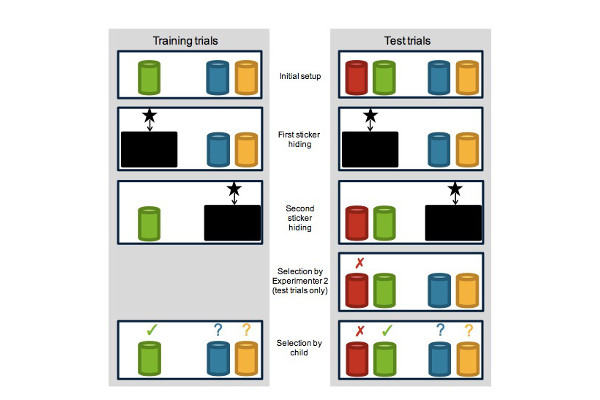How relevant to the psychology of mindreading is knowledge-first epistemology?
Some epistemic mental states with propositional content (e.g. knowing, perceiving, remembering) are commonly said to be factive on the grounds that one cannot know, see, hear or remember what is not
Could mindshaping be the bedrock of human social cognition?
The uniformity that unites us in communication and belief is a uniformity of resultant patterns overlying a chaotic subjective diversity of connections between words and experience. Uniformity comes
If teleology is the answer, what was the question?
Josef Perner is one of the leading developmental psychologists of mindreading (or mental state attribution). His contribution to the subject, including his influential (1991) book, has been huge. It
Are human toddlers unable to understand the aspectuality of a puppet’s belief that the bunny is not a carrot?
In an earlier post, I spelled out what philosophers and psychologists of mindreading call “the aspectuality of belief.” To understand the aspectuality of belief is to understand that a person can
What does the infant brain tell us about human Theory of Mind?
Functional near-infrared spectroscopy (fNIRS) is a non-invasive technique that measures how light scatters differently on the surface of the brain as a function of brain activity. It is less powerful
Children’s grasp of the aspectuality of beliefs: the Sefo task revisited
Understanding the aspectuality of belief is regarded by many leading developmental psychologists as a hallmark of full-blown theory of mind. As Hannes Rakoczy (2017, p. 692), who has devoted much
Is submentalizing part of the genetic tool-kit of human social cognition?
Findings from the developmental investigation of false-belief understanding in preverbal human infants, based on looking time (and other kinds of looking behavior) are relevant to hypotheses about
Can teleology explain why very young children help a mistaken agent?
3-year-olds fail to accurately predict where a mistaken agent is likely to look for her toy if they are explicitly asked to do so. However, preverbal infants (who are not asked anything in implicit
Could preschoolers learn to reason deductively?
Conceptual change or change of conception?
One basic issue raised by the study of both the history of science and human ontogenetic cognitive development is that of conceptual change: when should a
Why reading minds is not like reading words
Written by Brent Strickland and Pierre Jacob.
In a recent review paper in Science (2014. 344-6190) entitled “The cultural evolution of mind reading,” Cecilia Heyes and Chris Frith argue that
Another look at the two-systems model of mindreading
Apperly and Butterfill (2009) and Butterfill and Apperly (2013) have proposed a two-systems model of mindreading. According to this model, humans make use of two distinct psychological systems in
Do we use different tools to mindread a defendant and a goalkeeper?
Previously on cognitionandculture — Last year, Pierre Jacob posted a critical review of the so-called two-systems model of mindreading, according to which humans use two distinct mental tools to
Belief ascription in infants and children: the puzzle
In several recent papers on mindreading and belief-ascription, Ian Apperly and his colleagues have reported evidence suggesting that the process whereby human adults ascribe false beliefs to others
The scope of natural pedagogy theory (II): uniquely human?
This is the second post in a series of two installments by Pierre Jacob, dwelling on Gergely and Csibra's work on human communication. In Pierre's first post, we saw that these experiments show that,
The scope of natural pedagogy theory (I): babies
This is the first post in a series of two installments by Pierre Jacob, dwelling on Gergely and Csibra's work on human communication.
According to Csibra and Gergely’s (2009) so-called “natural
Pierre Jacob reviews ‘Mothers and Others’, by Sarah B. Hrdy
Review of Sarah Blaffer Hrdy, Mothers and Others, the Evolutionary Origins of Mutual Understanding. Cambridge, Mass: Harvard University Press (422 p.)
Sarah Blaffer Hrdy, a Professor Emerita of







